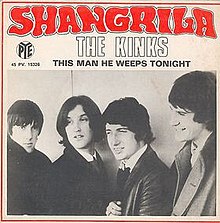Shangri-La (The Kinks song)
| "Shangri-La" | ||||
|---|---|---|---|---|
 |
||||
| Single by The Kinks | ||||
| from the album Arthur (Or the Decline and Fall of the British Empire) | ||||
| B-side | "This Man He Weeps Tonight" | |||
| Released | 12 September 1969 (UK) | |||
| Format | 7" vinyl | |||
| Recorded | May–June 1969 at Pye Studios (No. 2), London | |||
| Genre | Rock | |||
| Label | Pye 7N 17812 (UK) | |||
| Songwriter(s) | Ray Davies | |||
| Producer(s) | Ray Davies | |||
| The Kinks singles chronology | ||||
|
||||
| Arthur (Or the Decline and Fall of the British Empire) track listing | ||||
|
12 tracks
|
||||
"Shangri-La" is a song written by Ray Davies of The Kinks. The song appeared on the 1969 concept album, Arthur (Or the Decline and Fall of the British Empire). The song's inspiration can be traced back to when the band visited the Davies brothers' sister, Rose, and her family in Australia, the "designed community" that the family lived in serving as the initial lyrical inspiration. The song's highly ironic lyrics comment on British class society while portraying Arthur, the album's ill-fated protagonist, and his empty life in the suburbs. The musical aspects of the song both reflect and comment on the mood of the lyrics.
"Shangri-La" was released as the second single from Arthur in the United Kingdom, backed with "This Man He Weeps Tonight." The single was a commercial failure, not reaching the charts in any countries besides the Netherlands. The members of the band, however, thought highly of the song, with both Dave Davies and John Dalton singling it out for praise.
The initial inspiration for "Shangri-La" came when Rose Davies, the sister of Kinks members Ray and Dave Davies, moved with her husband to Australia. When the band performed a show in the area during January 1964, the Davies brothers visited their sister in the Adelaide village, Little Elizabeth, where she and her family lived in a semi-detached home in a "designed community." This event was later used as the basis for the song in 1969.
The track forms the centerpiece of Arthur (Or the Decline and Fall of the British Empire). The song opens quietly with the picking of an acoustic guitar in a minor key, soon to be joined by Davies singing. The lyrics are rife with commentary on British class society and are highly ironic, and in the beginning seemingly condescending, as they mock the illusions of the protagonist Arthur, speaking of his modest home, which he has paid for through a life of toil and hard work, as if it is a some kind of paradise or "kingdom to command," replete with typical modern conveniences such as indoor plumbing and a rocking chair, unlike the kind of working class house in which he grew up with "lavatories in the back yard," but which has turned out to become strangling and prisonlike with "mortgage hanging over his head," "bills and the water rates and payments on the car," as well as nosy and meddlesome neighbors. Davies provides a note of empathy for Arthur's empty life in a line stating that he accepts this because "he's conditioned that way." However, the bridge rocks harder as the lyrics express anger at the superficial suburban lifestyle that Arthur has bought into and his fear of confronting a "false Eden."
...
Wikipedia
